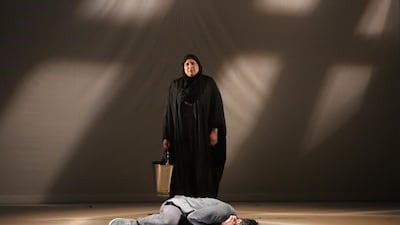As we navigate the world of social media, learning to redraw the line between what is private and what can be made public, challenges remain. Emirati playwright Mari Halyan addresses these and the impact they have on contemporary Arab families, in his play Talaya Al Layl, which is showing at the Abu Dhabi Cultural Foundation today.
The play highlights the strife between a young couple: Hamda (Dalal Al Yaser) plunges into the world of social media after the death of her father, a muezzin. She is eager to achieve fame as an influencer and garner as many followers as she can. Her husband, Abdullah (Abdullah Al Kamali), is tormented by her disregard for local customs and sees characteristics he associates with his father in her. Abdallah's father (Khaled Al Banay) is an overbearing alcoholic and spends more time in bars than at home.
Halyan, who also directed the play, says he chose to strip the set design to its bare necessities, inspired by the Empty Space theories of British director Peter Brook. "The play doesn't follow a conventional style," Halyan says. "It is more of a movement piece. The set design is minimalistic and there are barely any props or identifying markers."
While most of the actors are seasoned performers, it is Al Kamali’s debut role. “Much of the play relies on the actors’ performances and their ability to bring the text to life,” Halyan says. “There were challenges with casting a newcomer as my lead actor, but Kamali had a wonderful physical presence that I thought fit the role perfectly.”
The play, which was produced by Ras Al Khaimah National Theatre, first debuted at Sharjah Theatre Days in March. Halyan says it was received well and that he hopes it can stand the test of time. "Unlike the West, the Arab Gulf did not gradually come into modernity," he says. "It dove headfirst into it in the span of a few years.
“How are we – as a society – adapting to the changes brought on by our economic boom and rapid technological advancement? Are we doing so gracefully or blindly? Do we risk losing our traditional values for the sake of modernity? These are the questions I wanted to put forward in my play.”
Halyan says that while many are learning to balance traditional values with the public life of social media effectively, there are also those doing so with less grace. "I was prompted to write the play after witnessing a rise of questionable posts on Instagram and Facebook. People seem to be doing anything and everything for the sake of followers and fleeting fame. It made my blood boil. After all, these are our children, our sons and daughters.
“I am not against modernity and encourage development. It is necessary to keep up with the times but it is also important that we retain our traditional values and be careful not to sacrifice them in the face of modernity.”
Talaya Al-Layl will be performed at the Cultural Foundation, Al Hosn, Abu Dhabi, at 8pm today. Tickets from Dh30. More information at www.culturalfoundation.ae


